|
|
|
Sort Order |
|
|
|
Items / Page
|
|
|
|
|
|
|
| Srl | Item |
| 1 |
ID:
071185
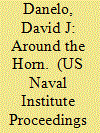

|
|
|
| 2 |
ID:
114834
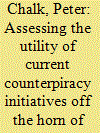

|
|
|
|
|
| Publication |
2012.
|
| Summary/Abstract |
This article examines the current international response to piracy and armed robbery off the Horn of Africa (HoA). It first describes the measures that are presently in place before going on to assess the relevance of these responses, both in terms of serving as a viable deterrent and in the context of addressing the root causes driving armed maritime crime in this part of the world. The article concludes by offering some tentative recommendations on how best to improve the regime of antipiracy in the HoA, focusing on capacity-building, the development of sub-regional maritime security arrangements, incentives to better engage the shipping industry in mitigation efforts and micro socioeconomic development projects in coastal regions of Somalia that support piracy.
|
|
|
|
|
|
|
|
|
|
|
|
|
|
|
|
| 3 |
ID:
171246


|
|
|
|
|
| Summary/Abstract |
The Middle East and the Horn of Africa exist in two distinct regional security complexes (RSCs), groupings of states exhibiting intense security interdependence within a distinct region, but rarely between regions. Recent geopolitical changes and related analyses, however, point to either a subsuming or a joining of the two RSCs, potentially leading to a high degree of uncertainty in two conflict-prone regions. Given the importance of such developments, we question this theory of RSC expansion by offering a concise review of recent security interactions between the two RSCs as well as quantitatively and qualitatively measuring the material power capabilities of relevant states. Borrowing from and contributing to RSC theory, we also identify and analyse concepts and indicators such as threat perception and sub-regional alliances. Our findings demonstrate the Middle East RSC is not expanding to include that of the Horn of Africa. The two remain distinct and under internal consolidation, despite the current discourse. Rather, high polarity in the Middle East coupled with often-congruent interests in Horn of Africa states best explains the current pattern of their interaction, particularly as Middle East states pursue strategies that further their own security interests at the expense of rival states within their own RSC.
|
|
|
|
|
|
|
|
|
|
|
|
|
|
|
|
| 4 |
ID:
076420


|
|
|
|
|
| Publication |
2007.
|
| Summary/Abstract |
The Greater Horn of Africa, the hottest conflict zone in the world, is a legitimate concern of U.S. officials. But their overwhelming focus on stemming terrorism there is overshadowing U.S. initiatives to resolve conflicts and promote good governance -- with disastrous implications for regional stability and U.S. counterterrorism objectives themselves
|
|
|
|
|
|
|
|
|
|
|
|
|
|
|
|
| 5 |
ID:
183923


|
|
|
|
|
| Summary/Abstract |
This study uses ethnography along Ethiopian women's irregular migration routes through Djibouti to analyse the complex reasons women leave home to seek labour opportunities in the Gulf States. Theories and policies that either narrowly depict women's motivations as economic in nature or focus only on women's needs for security and protection, fail to account both for the politics of seeking employment abroad, and the ways migration provides women a potential refuge from various forms of violence at home. Using a feminist analysis, we argue that women do not migrate only for financial opportunities, but also to escape combinations of domestic, political and structural violence. As such, irregular migration both evinces a failure of asylum systems and humanitarian organisations to protect Ethiopians, and a failure of the state to provide Ethiopian women meaningful citizenship. Lacking both protection and meaningful citizenship, international migration represents women's journeys for opportunity and emancipation.
|
|
|
|
|
|
|
|
|
|
|
|
|
|
|
|
| 6 |
ID:
189003
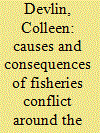

|
|
|
|
|
| Summary/Abstract |
Fisheries conflict is an underappreciated threat to the stability and health of communities. Declining fish populations, rising demand for seafood, and efforts to reduce illegal fishing are increasing the risk that conflict over fisheries resources will undermine stability and peace. Here, we investigate the frequency, causes, and consequences of fisheries conflict in six countries around the Horn of Africa and East Africa (Tanzania, Kenya, Somalia, Djibouti, Eritrea, and Yemen) between 1990 and 2017. Fisheries conflict events were cataloged from news reports, and events were characterized by the date, location, actors, consequences, and drivers of the conflict. We found the rate of fisheries conflict is gradually increasing in the region, with spikes in conflict driven by the arrival of foreign fishing boats or international naval vessels. Conflict was caused primarily by illegal fishing, foreign fishing, weak governance, limits on access to fishing grounds, and criminal activities including piracy. Two-thirds of all conflict events occurred in Kenyan and Somali waters, with areas of high conflict intensity in the Lake Victoria region, near the Somali coastline, and in the southern Red Sea. During this period, 684 fisheries conflict events in the region resulted in over 400 fatalities, nearly 500 injuries, and over 4,000 arrests.
|
|
|
|
|
|
|
|
|
|
|
|
|
|
|
|
| 7 |
ID:
120221
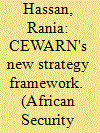

|
|
|
|
|
| Publication |
2013.
|
| Summary/Abstract |
A decade after establishing the Conflict Early Warning and Response Mechanism (CEWARN) of the Intergovernmental Authority on Development (IGAD), the member states endorsed the new strategy framework that is to guide the work of CEWARN until 2019. Although the original legal foundation upon which CEWARN was founded did not specify the types of conflicts that it could be involved in, CEWARN chose to limit itself to cross-border pastoral conflicts. This was partially due to the low levels of confidence between the member states, which prevented CEWARN from engaging in other types of conflicts that are considered to be more 'political' and thus more 'sensitive'. The hope was that after asserting its own success in dealing with cross-border pastoral conflicts, CEWARN would be able to expand its geographical as well as thematic scope. Thus, the most pronounced aspect of the new strategy framework is the expansion of CEWARN operations beyond their current limited focus. Although it is too early to assess the new strategy framework, I attempt to provide a reading of the future of this strategy plan, with particular reference to Sudan and South Sudan. I argue that despite the rhetoric that accompanied the endorsement of the new strategy, the prospects of the new plan in Sudan and South Sudan depend on a number of factors: first, enhancing the mutual trust between Sudan and South Sudan with regard to exchange of information; second, changing Sudan's perceptions with regard to IGAD; and third, securing the much-needed funding for such an expansion of CEWARN's work.
|
|
|
|
|
|
|
|
|
|
|
|
|
|
|
|
| 8 |
ID:
161986
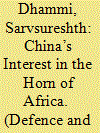

|
|
|
| 9 |
ID:
116363
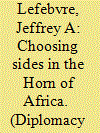

|
|
|
|
|
| Publication |
2012.
|
| Summary/Abstract |
The United States has faced at times the policy dilemma of seeing conflict erupt between two countries with which it maintains friendly diplomatic relations. The bureaucratic biases of relevant agencies can play an important role in determining whether to choose sides or remain neutral in these conflicts. In the early 1960s the Africa Bureau adopted a pro-Ethiopia bias that shaped American policy in the Horn of Africa. With the insights provided by the 2010 Wikileaks cables, this analysis explores how the "Ethiopia imperative" affected three inter-related American policy decisions in the Horn of Africa in the early twenty-first century: the decision to support Ethiopia despite its refusal to abide by a legally binding decision that favoured Eritrea following the 1998-2000 Eritrea-Ethiopia border war; to give Ethiopia what amounted to a "blank cheque" to invade Somalia in December 2006 and overthrow the Council of Islamic Courts (CIC); and to confront and isolate Eritrea diplomatically for waging proxy war against Ethiopia in Somalia.
|
|
|
|
|
|
|
|
|
|
|
|
|
|
|
|
| 10 |
ID:
139503
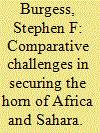

|
|
|
|
|
| Summary/Abstract |
Geography helps to explain why violent extremist organizations are difficult to counter; vast ungoverned spaces combined with weak states make it nearly impossible to decisively defeat them. However, partial success has been achieved by the United States in the Horn of Africa with a strategy of training, equipping, and supporting African intervention forces and attacking extremist leaders. In contrast, a strategy of containment in the Sahara, focusing on counterterrorism training for regional security forces and countering extremist ideology, did not succeed in preventing militant groups from taking over northern Mali and expanding their activities to other parts of the region.
|
|
|
|
|
|
|
|
|
|
|
|
|
|
|
|
| 11 |
ID:
184841
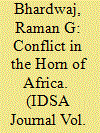

|
|
|
| 12 |
ID:
144274
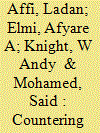

|
|
|
|
|
| Summary/Abstract |
Employing secondary research and semi-structured interviews, this article examines the use of private maritime security companies (PMSC) in providing maritime security services in the Horn of Africa. It consists of four parts. The first part explains the origins and development of the use of PMSC in the Horn of Africa. The second section discusses the regulation of the private security industry, paying particular attention to the maritime context. Part three examines the challenges associated with the use of maritime PMSC in the Horn of Africa, including negative human rights implications, compromising the innocent passage of commercial ships, and creating confusion in the hierarchical control of ships. Finally, the paper analyses the findings and concludes that PMSC, despite their apparent short-term effectiveness, cannot be regarded as a long-term solution to the piracy phenomenon in the Horn of Africa.
|
|
|
|
|
|
|
|
|
|
|
|
|
|
|
|
| 13 |
ID:
177547
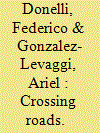

|
|
|
|
|
| Summary/Abstract |
This paper aims to analyse the growing enlargement of the spheres of competition from the Middle East into the Horn of Africa. It does so by using insights from regional order and realist neoclassical literature to understand the expansion of regional powers into this area as the result of strategic interactions within their own region. The central argument is that the clashing interests among Middle Eastern regional powers and power asymmetry with Horn of Africa countries are driving an increased security interdependence between the two Red Sea shores. This increasing security engagement by competing Middle Eastern states is producing an insecurity spillover which threatens to exacerbate regional instability in the Horn. It also presents a new role for Middle Eastern regional powers as security providers, particularly in the case of the United Arab Emirates, Saudi Arabia, Israel and Turkey. To substantiate this argument, the paper analyses interregional security dynamics by focusing on three empirical cases in the 2015–2020 period: The Gulf Cooperation Council’s crisis, the establishment of a Turkish military bases in the Horn of Africa and Israel’s new diplomatic engagement in Eastern Africa.
|
|
|
|
|
|
|
|
|
|
|
|
|
|
|
|
| 14 |
ID:
062802
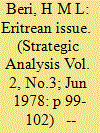

|
|
|
| 15 |
ID:
128229
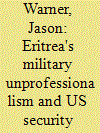

|
|
|
|
|
| Publication |
2013.
|
| Summary/Abstract |
The United States military's Combined Joint Task Force - Horn of Africa (CJTF-HOA) is in need of capable and dependable regional military allies as it seeks to bring stability to the Horn of Africa. Eritrea - once a proclaimed US friend and home to one of Africa's largest military establishments - superficially seems to fit the bill. Drawing from literature on the 'unprofessional nature' of African militaries as well as the scant amount of open source material available on the notoriously secretive nation, this article argues that despite its experienced and well-funded military, President Isaias Afewerki's overbearing control of it has made Eritrea's military highly 'unprofessional' in various ways. As a result, a military that could be a useful US ally in a historically tenuous region will likely remain more of a problem than a boon for the United States into the foreseeable future.
|
|
|
|
|
|
|
|
|
|
|
|
|
|
|
|
| 16 |
ID:
185916
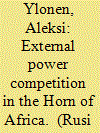

|
|
|
|
|
| Summary/Abstract |
External power competition in the Horn of Africa is intensifying. In recent years, the US and China, as well as regionally powerful states such as Saudi Arabia, Turkey, the UAE and Qatar, have all deepened their involvement in the sub-region. This has opened new opportunities for state and non-state actors in the Horn to gain influence through financial and material resources by associating themselves with external powers. Somaliland is one such actor. In the current scenario, Hargeisa’s increasingly sophisticated foreign policy has enabled it to step up its quest for international recognition and development. In this article, Aleksi Ylönen discusses the increasing contestation of influence among external powers in the Horn of Africa and Somaliland’s position in this changing regional context.
|
|
|
|
|
|
|
|
|
|
|
|
|
|
|
|
| 17 |
ID:
190360
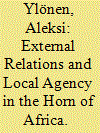

|
|
|
|
|
| Summary/Abstract |
Strategic and security analysis of the Horn of Africa systematically portrays the roots of instability as external. However, the region’s stability or instability is largely determined by local actors and conditions. Local agency and context largely set the conditions for the involvement of external actors. This article discusses how state and nonstate actors have conducted their engagement with outside powers, especially the Gulf states, at a time of increasing rivalry for influence in the Horn of Africa, with examples ranging from Ethiopia to Somalia, and from Djibouti to Somaliland.
|
|
|
|
|
|
|
|
|
|
|
|
|
|
|
|
| 18 |
ID:
172388
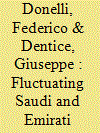

|
|
|
|
|
| Summary/Abstract |
The overthrow of Omar al-Bashir after three decades of rule has brought to light a dynamic that has been present for years: an interweaving of political, economic and security issues between the states of the Horn of Africa and the Gulf monarchies. Since 2011, the most active powers are the Kingdom of Saudi Arabia and the United Arab Emirates, which seek political support to counter both Iran’s influence and the growing Turkish presence. The two Gulf monarchies’ search for alignments with African counterparts has favoured the continuous reshuffling of alliances with direct effects on the local actors’ strategic choices. These dynamics need to be considered to understand the determinants behind the currently increasing instability in the Red Sea area.
|
|
|
|
|
|
|
|
|
|
|
|
|
|
|
|
| 19 |
ID:
156849
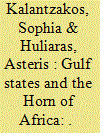

|
|
|
| 20 |
ID:
052849
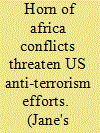

|
|
|
|
|
|
|
|